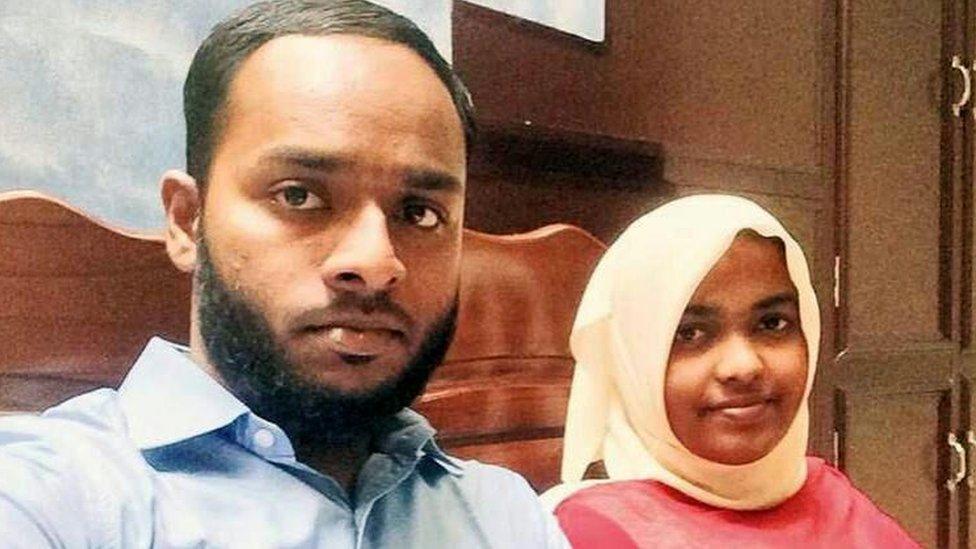Indian brands reckon with a new challenge: hate
- Published
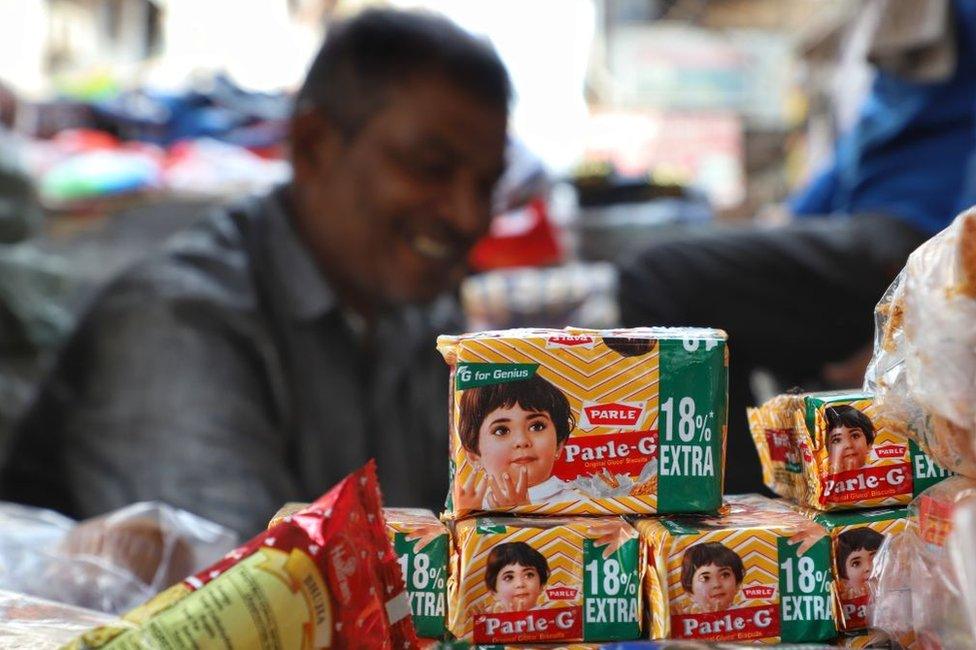
Parle-G is one of the brands that said it would not advertise on "toxic" platforms
The increasing power of social media, where outrage easily gathers pace, is forcing Indian brands to reckon with a new challenge: the politics of hate. BBC's Nikhil Inamdar and Aparna Alluri report.
Indian CEO Rajiv Bajaj made headlines earlier this month when he said his company would no longer advertise on media outlets that were a source of "hate-mongering" or "toxicity".
Mr Bajaj - who runs Bajaj Auto, India's biggest motorcycle manufacturer - was speaking to CNBC-TV18, external in the wake of a police investigation into three TV news channels, external who were accused of manipulating ratings and spreading fake news.
Reports said Mr Bajaj's company had blacklisted three TV news channels, though he has not named any publicly.
Days later, Parle-G, India's biggest biscuit maker, said it had decided not to advertise on channels that "broadcast toxic content", external. A senior executive said they were looking to send "a clear signal to all the news channels that they better change their content".
These brands are household names. It is something of a surprise they have chosen to speak up - Indian companies typically shy away from public stances, unlike in the West where big businesses have recently come out in support of progressive causes like LGBTQ rights, or spoken out against hate speech and racism.
But Indian brands may soon have to start rethinking this strategy.
In recent months, ratings for a section of TV news media soared amid the frenzied coverage that followed the death of Bollywood actor Sushant Singh Rajput. But they also drew flak for their shrill, sensationalist and often defamatory reporting - from accusing Rajput's girlfriend Rhea Chakraborty of driving him to suicide to airing images of his body to speculating on wild theories about the couple's personal lives.
Much of this coverage was spurred by troubling Twitter trends and trolls, which led to a backlash.
"We've taken cognisance of this issue, and periodically review our media plan," the marketing head of another top auto manufacturer told the BBC. "This is a turning point and budgets are anyways being redirected from traditional media towards digital platforms."
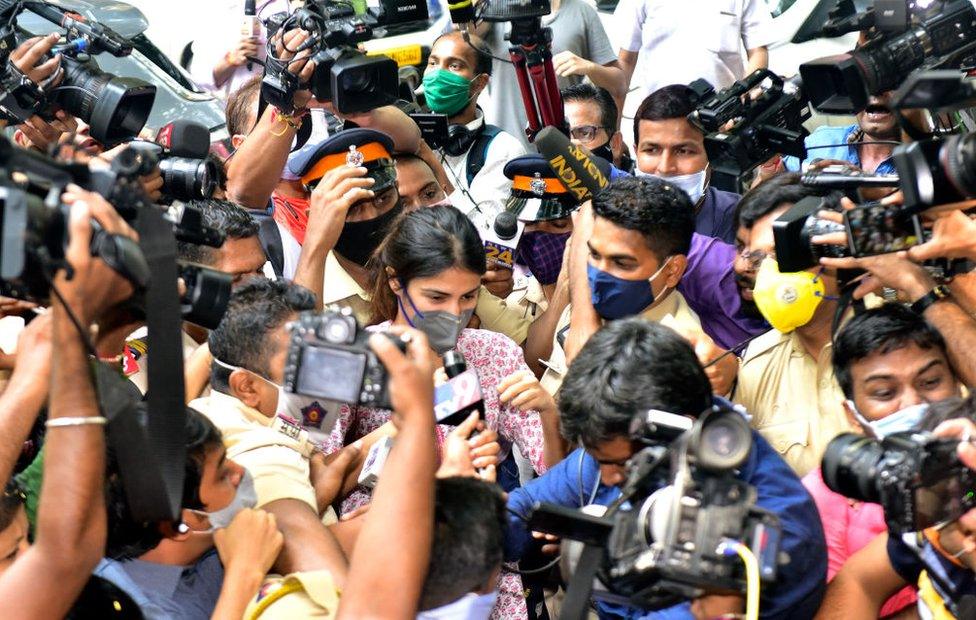
The trolling around Rhea Chakraborty was especially vicious
Other consumer brands, such as dairy giant Amul, which spends 40-50% of its advertising budget on news channels, and grocery chain owner Future Group have said they are worried about the growing negativity and aggression, external on some platforms.
Ad expenditure on news channels has dipped in recent years, partly due to an economic slowdown. But experts say increasing concern over "brand safety" is also a reason.
"Brands just don't want to be seen sponsoring, or even tacitly condoning, content that their consumers might find abhorrent," says veteran media consultant Paritosh Joshi. "But this isn't an altruistic or socially enlightened view. It's purely a business decision. Brands want to be known by the company they keep."
Growing activism by media watchdogs like Newslaundry, who've sought to hold brands accountable for funding vitriolic content, has played a part too, Mr Joshi adds.
"For toxic news to be shown the door, advertisers have to take a stand - spend by principle, spend on principle," says Suparna Singh, senior executive at news broadcaster NDTV.

Bajaj is an iconic two-wheeler brand in India
But actively supporting certain causes or ideas rather than just denouncing others is far trickier, Mr Joshi says.
So while October began with leading companies seemingly taking a stand against toxic trends, it ended on quite the opposite note.
A touching 43-second ad, showing a Muslim family throwing a baby shower for their Hindu daughter-in-law, sparked a rightwing backlash that was shockingly swift and effective - Tanishq, the prominent jewellery brand withdrew their ad, citing staff safety and "hurt sentiments".
Tanishq executives declined to be interviewed by the BBC, but the trolling included physical threats and the names of some of the company's employees were circulated online.
"I didn't expect that the employees would get trolled or get threats," says Azaz Ul Haque, chief creative officer at the ad firm Mullen Lintas and a former employee of Tanishq's parent company, Titan. "When you start threatening a company as big as the Tatas… That was pretty surprising."
Tanishq is owned by the Tata group, one of India's biggest conglomerates, and many had expected them to brave the storm.
But the trolls summoned the bogey of "love jihad", a popular rightwing conspiracy theory that accuses Muslim men of seducing Hindu women to convert them.
"Nothing works as well for Hindu nationalism as love jihad. If there are two things they care deeply about - it's to keep Muslims down and control women," says author Snigdha Poonam, who has written extensively on what drives young, polarised Indians.
But she also cautions against believing this is necessarily the majority view: "There's only a section that's going online and it's those voices that we are seeing amplified and validated by the top leadership."
As examples, many point to the polarising, even anti-Muslim, rhetoric that has become the new normal, often echoed by members of Prime Minister Narendra Modi's Bharatiya Janata party.
"The events are different, the triggers are different, the patterns are the same," Ms Poonam says.
To be fair, the Tanishq ad also got a lot of support - ad associations said there was a need to strengthen and safeguard the fundamental right to express, external and several people on and off social media vowed to buy jewellery from the brand as a show of solidarity.
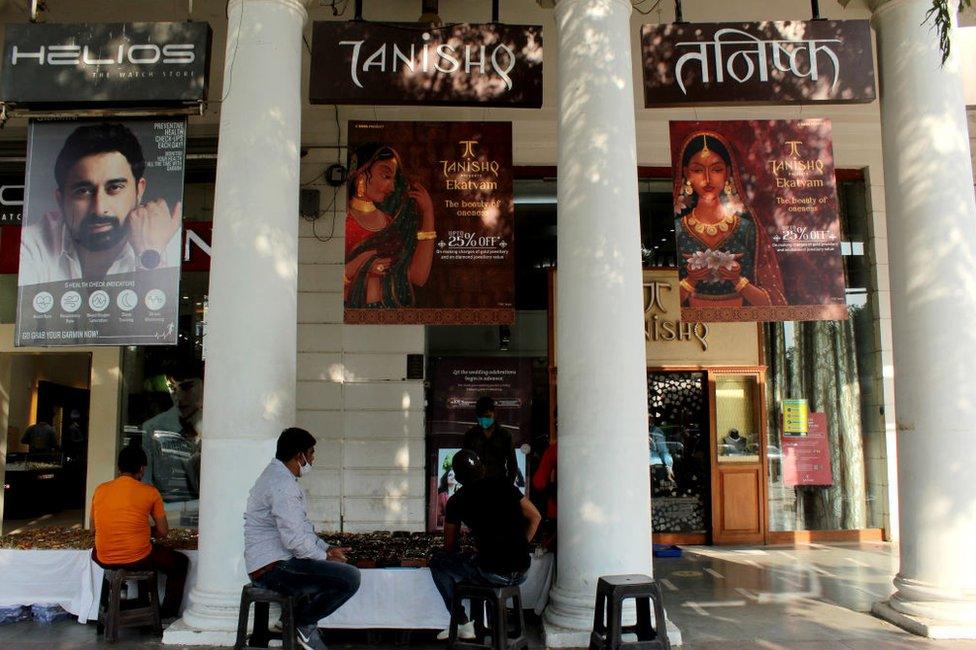
Tanishq is one of India's biggest jewellery brands
"The love on social media has been more than the hate," Amit Akali, who made the ad, said in a recent interview, external.
It was "organic and unprogrammed", he added, unlike the trolling which is known to be driven by bots and other fake accounts.
Mr Akali said he expected the ad to spark conversations, not controversy: "This is the reality of many of our lives. I am a Hindu-Sikh, married to a Parsi."
And that's what he wanted to bring to the ad which was part of a larger campaign called Ekatvam, or unity, about coming together during tough times, he added.
Tanishq is no stranger to bold ads and has been known for progressive campaigns. Mr Haque and others who work in advertising told the BBC that a campaign of this size would have been cleared by top executives. But it appears that no-one saw this coming.
The decision to pull the ad has also sparked criticism, with one journalist calling Ratan Tata, the 82-year-old former chairman of the Tata group, spineless on Twitter, external.
But "advertising is politics",, external wrote columnist Santosh Desai, saying that companies needed to "wake up to this reality".
And in today's India, interfaith marriages are deeply political. They have never been the norm but they aren't unheard of either. In fact, the row saw several interfaith couples speaking out in support of the ad, a sign of how many people it spoke to.
"That's the beauty of this country," says Mr Haque, himself a Muslim married to a Hindu. "It's not just about interfaith marriage. Every meal I eat is interfaith. Every memory of mine is interfaith."
- Published14 April 2019
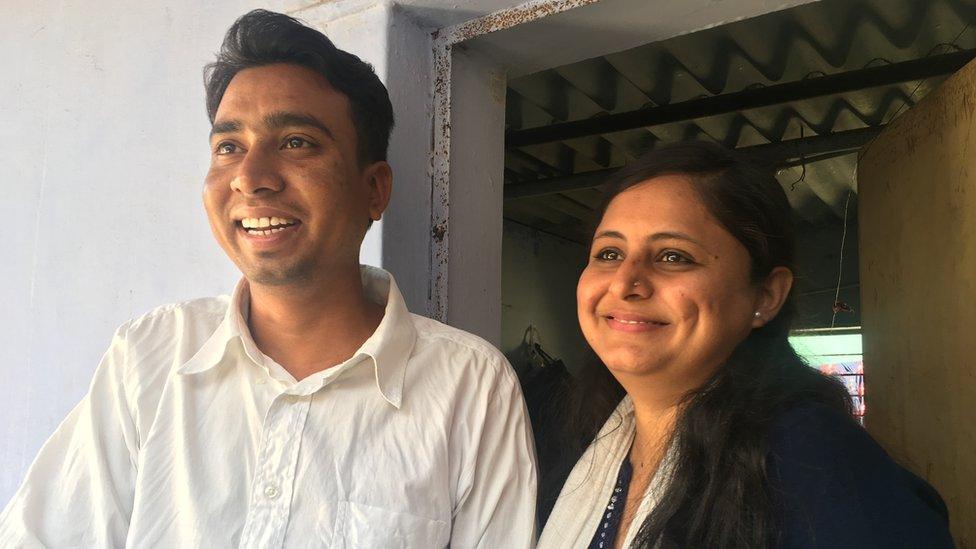
- Published16 October 2017
